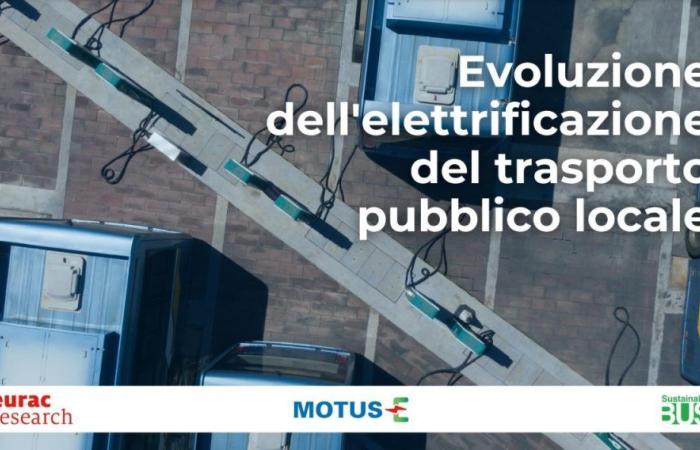According to the study “The evolution of the electrification of local public transport”, published today by Eurac Research, Motus-E and Sustainable Bus, «Thanks to technological progress, the electrification of local public transport on rubber is an increasingly established reality at European level. There are now all the conditions to fully intercept this trend also in Italy, starting from the possibility of a 1:1 replacement of buses with internal combustion engines, due to the significant increase recorded in the autonomy of battery-powered buses».
In recent years, the European urban bus market has seen significant growth in alternative traction, which in 2023 accounted for 73% of registrations, with electric buses taking the lion’s share, with a market share of over 40%. This trend is in line with the EU objectives for reducing CO2 emissions in the sector, according to which new urban buses will have to cut emissions by 90% by 2030, and achieve zero emissions for new registrations from 2035.
But Italy must catch up with other major European countries: “In 2023, in fact, only 27.5% of Italian urban bus registrations were electric, compared to the aforementioned 40% of fully electric vehicles registered on average in the Old Continent – the report underlines – Even the data on the urban bus fleet in circulation indicate the importance of an intervention, with an average age of operating vehicles in Italy of 10.3 years, approximately 33% higher than in countries such as France, Germany, Spain and the United Kingdom”.
At Motus-E they underline however that «The expected injection of new European funds for TPL will certainly represent an unmissable opportunity to accelerate the process of electrification of bus fleets in Italy, replicating throughout the Peninsula the best practices already observed in cities such as Genoa, Milan and Turin, where more than half of the electric buses registered in our country between 2022 and 2023 will circulate».
According to the study, “In 2050, the Italian bus fleet will be composed of 88% electric vehicles and 9% hydrogen vehicles, with extremely significant benefits on the quality of air in cities and on the reduction of climate-altering emissions, with negligible effects on the national electricity system. In fact, by 2050, an increase of 2.55 GW of installed capacity for vehicle charging is expected, a value that, for example, is lower than the new renewable capacity installed in Italy in 2023 alone.”
Meanwhile, having overcome the impasse on incentives, the Italian electric car market is accelerating strongly. According to Motus-E, “In June, the month that saw the entry into force of the new Ecobonus, 13,285 new full electric cars were registered in the Peninsula (+115.8% compared to the same month in 2023), with a market share growing to 8.3% (from 4.4% in June 2023). In this first half of the year, 34,709 electric cars were registered in Italy, up 6.2% compared to the same period in 2023, with a market share of 3.9% (in line with the first six months of last year). As of June 30, the Italian electric fleet in circulation stood at 251,023 cars.
Motus-E president Fabio Pressi highlights that «These initial data show that many Italians are ready to switch to electric and that the stall in registrations in recent months was linked to the wait for incentives. The effect of the orders made with the new Ecobonus will be fully revealed with deliveries in the coming months, but for the entire year we cannot expect results that are too different from 2023 in terms of full electric registrations. In any case, the success of the incentives shows that Italy can make up ground compared to other European big players in the electric car adoption curve. Furthermore, the imminent introduction of many new entry-level models could encourage the adoption of electric on a large scale, as is already happening in some markets».
In May, France, Germany and the United Kingdom recorded a market share of battery-powered vehicles of 17%, 12.6% and 17.6% respectively.
Pressi concludes: «To bring Italy back to the center of the European automotive market, effective planning of the tools aimed at incentivizing the demand for electric vehicles will be crucial, starting with the revision of taxation on company fleets, to allow citizens and companies to plan their choices in a clear, predictable and well-defined context».
For Latest Updates Follow us on Google News






